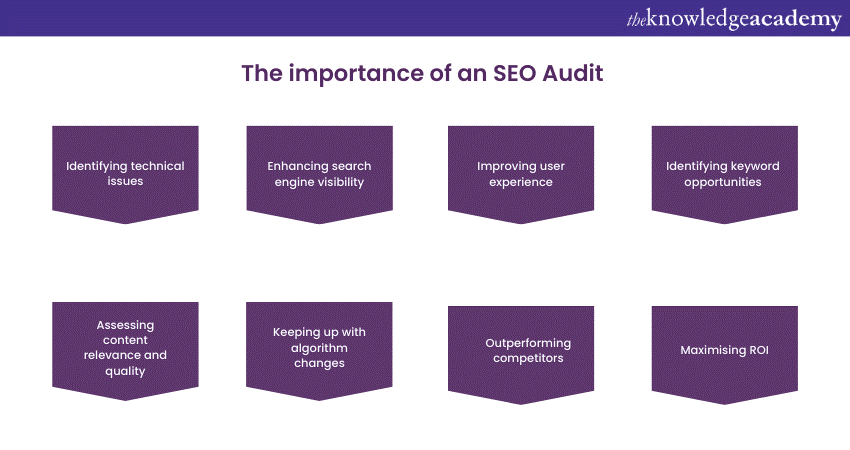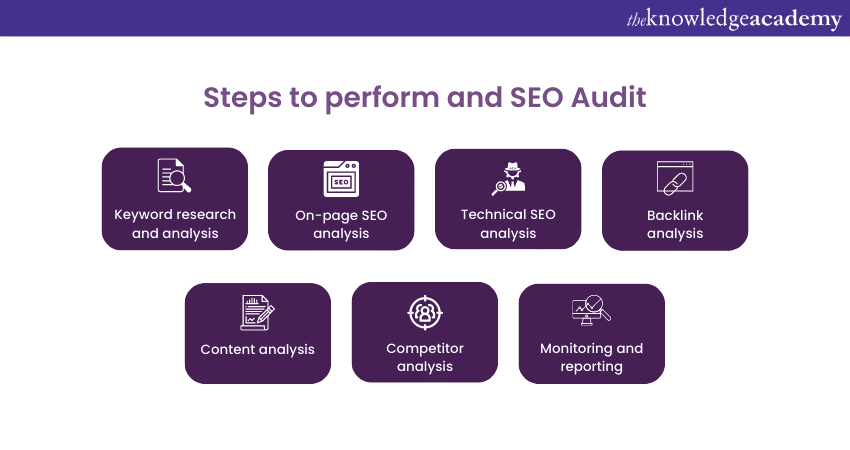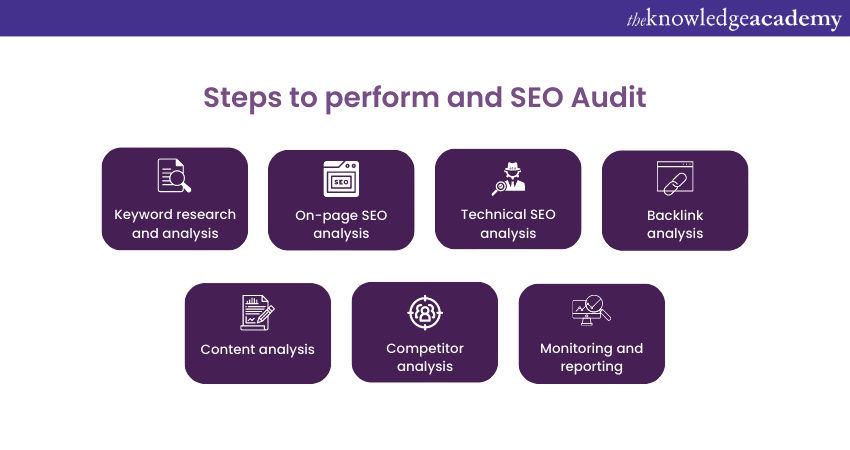We may not have the course you’re looking for. If you enquire or give us a call on 01344203999 and speak to our training experts, we may still be able to help with your training requirements.
We ensure quality, budget-alignment, and timely delivery by our expert instructors.

Imagine your website as a bustling digital storefront. Just as a shop owner regularly checks their displays, stock levels, and overall appearance, an SEO Audit is the routine check-up your website needs to ensure it’s in top shape. This essential process evaluates the health of your site, identifying areas that can enhance its performance and visibility.
Performing an SEO Audit is like giving your website a detailed health check, diagnosing its strengths and weaknesses. It’s the first step towards ensuring your site not only attracts visitors but also provides them with an excellent experience. In this blog, we’ll delve into the intricacies of these Audits, explore their benefits, and guide you through the process of performing one effectively.
Table of Contents
1) Understanding What is an SEO Audit
2) The importance of an SEO Audit
3) Types of SEO Audit
4) The tools necessary to conduct an SEO Audit
5) How to analyse the SEO Audit results?
6) Implementing the SEO Audit recommendations
7) How do you monitor and maintain SEO Performance?
8) Conclusion
Understanding What is an SEO Audit
An SEO Audit is like a check-up list. It is used for your website and judges to see how well it's performing. It also checks how it can be improved. It checks at the aspect of how people can find the site on search engine with ease!
During an SEO Audit, several important things are check-listed. First, the technical parts of the website, like its structure, speed, mobile-friendliness, and indexing, are analysed. These elements ensure that search engines can enter your site easily and users get a smooth experience.
Next, the content on your website is reviewed. This includes looking at meta tags, headings, keyword usage, and the quality of the content. Optimising these helps search engines understand what your site is about and makes it more relevant to users.
The Importance of an SEO Audit
Here is a list of the key aspects highlighting the importance of an SEO Audit:

a) Identifying technical issues: An SEO Audit helps uncover technical issues. These issues are responsible for hindering a website's performance. It includes issues such as broken links, slow page load speed, or improper indexing. Website owners can then point out and address the issues, thereby improving the overall user experience.
b) Enhancing search engine visibility: An SEO Audit examines various optimisation factors. These factors impact a website's visibility on search engine result pages (SERP). Website owners can optimise their on-page elements by improving keyword usage and analyse backlink profiles.
c) Improving user experience: User experience is an essential factor for both visitors and search engines. An SEO audit evaluates factors such as site structure, navigation, and mobile friendliness, ensuring that the website provides a seamless and user-friendly experience. By enhancing user experience, website owners can reduce bounce rates, increase engagement, and improve the overall satisfaction of their visitors.
d) Identifying keyword opportunities: Keyword research and analysis are essential components of an SEO audit. The identification of relevant keywords with high search volume and low competition helps website owners optimise their content. This improves their chances of ranking for targeted keywords, thereby increasing the likelihood of attracting organic traffic from users searching for those specific keywords.
e) Assessing content relevance and quality: Content is a crucial aspect of any website's SEO strategy. An SEO audit evaluates the relevance, quality, and engagement of the website's content. By identifying content gaps, optimising keyword usage, and improving overall content quality, website owners can provide valuable and informative content to their audience, establishing their authority and credibility in their respective industries.
f) Staying updated with algorithm changes: Search engine algorithms are always evolving. It works on the principle - what worked in the past may not yield the same results today. An SEO Audit helps website owners stay up to date with the recent algorithm changes and industry trends.
g) Outperforming competitors: An SEO audit includes analysing the performance and strategies of competitors. By identifying their strengths and weaknesses, website owners can gain important insights and discover opportunities to outperform them. This competitive analysis allows website owners to refine their own SEO strategies and differentiate themselves in the online marketplace.
h) Maximising ROI: Investing in SEO efforts are costly. It is expensive in terms of recourses and time. An SEO Audit helps ensure that the resources allocated to SEO are effectively utilised.
Learn the infrastructure and technologies of Data-Driven Marketing with our Data-Driven Marketing Course – join today!
Types of SEO Audits
There are a few types of SEO Audits. It helps in prioritising contents according to specific needs. Let’s have a look:
1) SEO Content Audit
This type refers to pinpointing opportunities in order to improve various elements. These include accuracy, recency, and quality of the content. It may also include identifying certain opportunities to optimise for the featured short snaps, particular section, and passage ranking.
2) On-page SEO Audit
This type of SEO makes sure the backend elements of a page are also optimised for audience. The On-page SEO Audit includes checking image alt texts, meta descriptions, meta titles, compressions, etc.
3) Off-page SEO
Off-page SEO Audit involves looking at other pages and other domains. It links to the pages the web surfer is looking for. It helps in improving the quantity, quality, recency and distribution of the links.
4) Local SEO Audit
Local SEO includes a set of practices that help businesses rank in local search. This is usually slightly smaller but still involves elements from other types of audits. It includes off-page listings and other On-page contents.
5) Technical SEO Audit
This type of SEO Audit involves on-page efforts. This includes image optimisation and other performance metrics like site, security and speed. A Technical SEO Audit identifies opportunities to recognise, fix, or eliminate code, or prevent spam.
Get the On-page SEO Cheat Sheet and start ranking higher in search results!
The Tools Necessary to Conduct an SEO Audit
Several tools can be instrumental in gathering data, analysing performance, and identifying areas for improvement. Listed below are some important tools for conducting SEO Audit:

a) Google Search Console: A tool designed by Google to offer valuable insights into a website's performance in search results. It provides data on search queries, indexing status, crawl errors, and more. With Google Search Console, website owners can monitor their website's health and identify indexing issues.
b) Google Analytics: Google Analytics is a robust tool for web analytics that provides detailed information about website traffic, user behaviour, conversions, and more. It offers necessary insights into visitor activities and their interactions with your website. It provides you information on which marketing channels are actually driving traffic.
c) SEO Audit tools: Various dedicated tools for conducting SEO Audits, such as SEMrush, Moz, and Ahrefs, can provide comprehensive website analysis and insights. These tools provide a range of features to assess various aspects of SEO, including keyword rankings, backlink profiles, site audits, and competitor analysis.
d) Keyword research tools: Keyword research is an important aspect of SEO audit. Tools like Google Keyword Planner, SEMrush Keyword Research, and Ahrefs Keyword Explorer help identify relevant keywords, assess search volume, competition, and uncover new keyword opportunities. These tools provide data-driven insights to optimise website content and target the right keywords for improved search engine rankings.
e) Backlink analysis tools: Backlinks play a significant role in SEO. Tools like Majestic, Moz's Link Explorer, and Ahrefs' Site Explorer offer in-depth backlink analysis. They provide information about the quality and quantity of backlinks, referring domains, anchor text, and more. With these tools, website owners can evaluate their backlink profiles, identify potentially harmful links, and find opportunities to build high-quality links.
f) Website crawler tools: Website crawler tools like Screaming Frog and DeepCrawl analyse the technical aspects of a website. They crawl through the website, identifying problems like duplicate content, missing tags or broken link and other server error.
g) Social media analytics tools: Social media presence is closely linked to SEO performance. Tools like Hootsuite, Buffer, and Sprout Social provide analytics and insights into social media engagement, reach, and audience demographics. By analysing social media data, website owners can evaluate the effect of their social media efforts on website traffic, brand visibility, and SEO performance.
Learn to build your brand’s loyalty and retain customers using mobile channels, by signing up for the Digital Marketing Courses now!
How to analyse the SEO Audit results?
It is crucial to analyse the results to gain valuable insights and determine the necessary actions for improving your website's Search Engine Optimisation. Here's how to effectively analyse the SEO Audit results:

a) Review the audit findings: Start by carefully reviewing the findings of your SEO audit. Pay attention to the key areas assessed, such as technical issues, on-page elements, backlinks, content quality, and keyword targeting. Take note of both the strengths and weaknesses identified during the audit.
b) Prioritise action items: Create a prioritised list. This list should include items of action based on audit examination. Determine which issues or optimisations have the highest impact and should be addressed first.
c) Identify quick wins: Look for quick wins—optimisations or fixes that can yield significant improvements with minimal effort. These could include fixing broken links, optimising meta tags, or improving website speed. By addressing these quick wins early on, you can see immediate positive results.
d) Set specific goals: Define specific goals for your SEO improvements based on the audit results. Whether it's improving search engine rankings, increasing organic traffic, or boosting conversion rates, having clear objectives will guide your actions and provide a measurable benchmark for success.
e) Develop an action plan: Based on the prioritised action items and goals, develop a detailed action plan. Segregate the tasks into many manageable steps and assign responsibilities to team members if necessary. Establish timelines and deadlines to ensure progress and accountability.
f) Monitor progress: Regularly monitor the implementation of the action plan and track the progress of each task. Use SEO Tools, analytics platforms, and monitoring systems to measure the impact of the optimisations and identify any unexpected issues or improvements.
g) Make iterative adjustments: SEO is an iterative process, and adjustments may be needed as you monitor the results and gather additional data. Analyse the impact of implemented changes and refine your strategies accordingly. Continuously adapt and optimise to achieve the desired outcomes.
h) Track key metrics: You can keep track of key metrics to assess your SEO efforts. Monitor changes in organic traffic, keyword rankings, conversion rates, and other relevant metrics. Compare the data before and after the audit to measure the impact of your optimisations.
i) Stay updated: Know about the latest SEO trends, algorithm and other best practices. Regularly review new developments and adjust your strategies as needed.
j) Periodic audits: Remember that an SEO audit is not a one-time task. Conduct periodic audits to reassess your website's performance and identify new areas for improvement. As your website evolves and search engine algorithms change, regular audits will help you stay on top of your SEO game.
Learn to identify industry trends and visitor engagement, by signing up for the Google Website Tools Training now!
Implementing the SEO Audit recommendations
Implementing the recommendations derived from an SEO Audit is an essential step that improves your website's Search Engine Optimisation. Here's how to effectively implement the recommendations for SEO Audits:
a) Prioritise recommendations: Start by prioritising the recommendations based on their impact and feasibility. Focus on addressing critical issues first, such as fixing broken links, resolving duplicate content, or optimising meta tags. This ensures that you tackle the most impactful optimisations first and lay a strong foundation for further improvements.
b) Develop an action plan: Create an action plan which is detailed. This plan of action should have all tasks outlined that needs to be implemented. After that, you can easily break these tasks down into doable steps.
c) Technical implementations: Address technical recommendations such as improving website speed, optimising URL structure, implementing structured data markup, and ensuring mobile friendliness.
d) On-page optimisations: Optimise on-page elements based on the audit recommendations. Update meta tags, headings, and URLs to be descriptive and keyword-rich. Improve keyword targeting within the content and ensure proper formatting and readability. Update or create new content to align with target keywords and provide value to users.
e) Backlink management: Act on the backlink recommendations by building high-quality, relevant links and disavowing harmful or low-quality links. Check for authoritative websites in your domain for link-building opportunities.
f) Content enhancements: Implement content recommendations by improving existing content and creating new, informative pieces. Ensure that your content aligns with target keywords, covers relevant topics, and provides value to your audience. Consider adding multimedia elements, improving formatting, and enhancing engagement factors such as images, videos, and infographics.
g) Tracking and measurement: Set up proper tracking and measurement systems to monitor the impact of the implemented changes. Make good use of tools like Google Search Console and Google Analytics to track changes in organic traffic and keyword rankings.
h) Ongoing optimisation: SEO is an ongoing process, and continuous optimisation is necessary for long-term success. Stay updated with the industry trends, algorithm changes, and user behaviour. Keep monitoring your website's performance and make iterative changes depending on the data and feedback you receive.
i) Test and iterate: Implement changes in stages and test their impact on your website's performance. Use A/B testing, split testing, or other methods to assess the effectiveness of different optimisations. This allows you to refine your strategies and concentrate on the tactics that deliver the best results.
j) Regular audits: Regularly conduct SEO audits to reassess your website's performance and identify new areas for improvement. As your website evolves and search engine algorithms change, periodic audits help you stay ahead of the curve and ensure that your SEO efforts remain effective.
Learn the best practices for optimising your landing page, by signing up for the Landing Page Optimisation Training course now!
How to monitor and maintain the SEO performance?
Here are the essential steps for companies to follow to monitor and maintain their SEO performance, discussed below:
a) Set-up SEO performance metrics: Define key performance indicators or KPIs for measuring the effectiveness of your SEO efforts. Common metrics include organic traffic, keyword rankings, conversion rates, bounce rates, and backlink profiles. Employ tools like Google Analytics and SEO platforms to track and analyse these metrics.
b) Regularly monitor performance: Continuously monitor the established metrics to track changes and identify any fluctuations or trends. Keep an eye on the organic search traffic, keyword rankings, and user behaviour on your website. Set up regular reporting to stay informed about the performance on a weekly, monthly, or quarterly basis.
c) Analyse and interpret data: Analyse the data collected from monitoring tools to gain insights into your SEO performance. Look for patterns, identify areas of improvement, and spot potential issues. For example, if certain keywords are losing rankings, investigate the causes and take corrective actions.
d) Stay updated with algorithm changes: Search engine algorithms evolve over time, impacting SEO performance. Stay informed about major algorithm updates, industry trends, and best practices. Regularly follow reputable sources and SEO communities to keep up with the latest changes. Adjust your strategies and tactics accordingly to align with the evolving search landscape.
e) Refine and optimise content: Continuously optimise your website's content based on data analysis and user feedback. Refine your keyword targeting, update outdated information, and improve engagement factors such as multimedia elements and user experience. Regularly publish fresh, high-quality content to attract both users and search engines.
f) Build and monitor backlink profile: Monitor your backlink profile regularly to identify new backlinks, assess their quality, and remove any harmful or irrelevant links. Focus on building high-quality, authoritative backlinks through ethical strategies like outreach, guest posting, and content promotion. Regularly review and disavow any spammy or low-quality links.
g) Keep up with SEO best practices: Stay informed about SEO best practices and adjust your strategies accordingly. Regularly review and optimise technical aspects such as website speed, mobile-friendliness, and structured data markup. Stay up to date with on-page optimisation techniques, content quality guidelines, and user experience improvements.
h) Monitor competitor performance: Regularly analyse and monitor your competitors' SEO performance. Identify their strategies, strengths, and weaknesses. You can adapt and refine your personal strategies by remaining updated of the tricks, giving you a competetive edge.
i) Test and iterate: Continuously test different SEO tricks and strategies to see what works best for your website. Utilise A/B testing, split testing, and other tactics to estimate the impact of changes and optimise accordingly.
j) Stay engaged in the SEO community: Engage with the SEO community through forums, blogs, and industry events. Participate in group discussions, share insights, and learn more from others. The SEO landscape is constantly evolving, and being an active participant in the community helps you stay informed and adapt to changes effectively.
Conclusion
Conducting an SEO Audit and implementing the recommendations derived from it are essential steps for improving a website's Search Engine Optimisation. Website owners can analyse the Audit results, prioritise actions, and continuously monitor and refine the SEO performance to enhance their website's visibility, attract organic traffic, and achieve their SEO goals. Websites can stay ahead in the competitive online landscape and drive long-term success with regular audits and ongoing optimisation.
Learn techniques to optimise websites with our Search Engine Optimisation Training – register today!
Frequently Asked Questions
How Long Does it Take to see Results From Implementing Changes Suggested by an SEO Audit?

On an average SEO takes between three to six months to start showing results.
How to Recover From any Google Penalty?

Manual Google penalties typically last for 10-30 days after implementing appropriate solutions. Algorithmic Google penalties can also last up to 6 months depending on what the penalty was applied for. Check for a ranking problem, investigate about recent algorithm updates, run SEO Audit and content audit, and clear backlink profile.
What are the Other Resources and Offers Provided by The Knowledge Academy?

The Knowledge Academy takes global learning to new heights, offering over 3,000 online courses across 490+ locations in 190+ countries. This expansive reach ensures accessibility and convenience for learners worldwide.
Alongside our diverse Online Course Catalogue, encompassing 19 major categories, we go the extra mile by providing a plethora of free educational Online Resources like News updates, Blogs, videos, webinars, and interview questions. Tailoring learning experiences further, professionals can maximise value with customisable Course Bundles of TKA.
What is The Knowledge Pass, and How Does it Work?

The Knowledge Academy’s Knowledge Pass, a prepaid voucher, adds another layer of flexibility, allowing course bookings over a 12-month period. Join us on a journey where education knows no bounds.
What are Related Courses and Blogs Provided by The Knowledge Academy?

The Knowledge Academy offers various Digital Marketing Courses, including Digital Marketing Course, Social Media Marketing Course, SEO Course and Google Analytics Certification. These courses cater to different skill levels, providing comprehensive insights into Technical SEO.
Our Digital Marketing Blogs cover a range of topics related to SEO, offering valuable resources, best practices, and industry insights. Whether you are a beginner or looking to advance your SEO Audit skills, The Knowledge Academy's diverse courses and informative blogs have you covered.
Upcoming Digital Marketing Resources Batches & Dates
Date
 SEO course
SEO course
Fri 28th Mar 2025
Fri 23rd May 2025
Fri 25th Jul 2025
Fri 26th Sep 2025
Fri 28th Nov 2025






 Top Rated Course
Top Rated Course



 If you wish to make any changes to your course, please
If you wish to make any changes to your course, please


